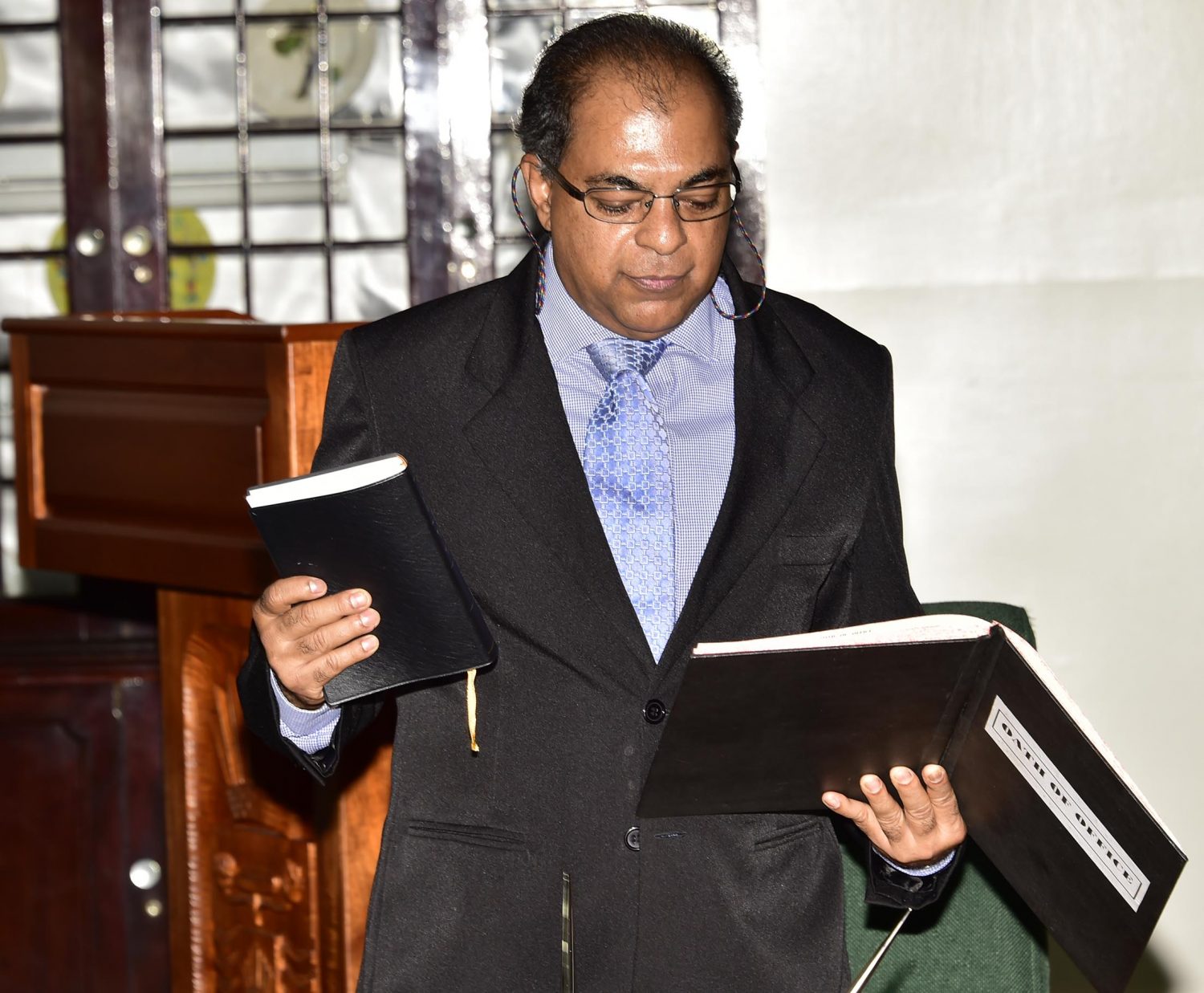In keeping with government’s commitment to ensuring that the judicial system has the full complement of legal officers, magistrates and judges, Senior Counsel Rafiq Khan was yesterday sworn in as a temporary Appellate Judge by President David Granger.
“It is my hope that the appointment this morning of Mr. Rafiq Khan, now Justice Rafiq Khan, as an acting judge will serve to preserve and protect the rights of our citizens to equal protection and benefit of the law. This appointment has been made in accordance with the Constitution, Granger said during a simple swearing-in ceremony held at State House.
Justice Khan will sit on the bench for six months. His nomination was approved by Judicial Service Commission (JSC) before its life ended last year. Justice Khan who was elevated to SC in February last, is now the second temporary appellate judge. Former Magistrate and University of the West Indies (UWI) lecturer Christopher Arif Bulkan who was appointed on January 17, like Justice Khan will sit on the bench for six months. The Court of Appeal now has a complement of six judges.
Granger, in his remarks, said that the supreme law of the land, the Constitution, provides in Article 149D (1)), that: “The State shall not deny to any person equality before the law or equal protection and benefit of the law.
He adverted to the International Covenant on Civil and Political Rights (at Article 26) which states “All persons are equal before the law and are entitled without any discrimination to the equal protection of the law. In this respect, the law shall prohibit any discrimination and guarantee to all persons equal and effective protection against discrimination on any grounds such as race, colour, sex, language, religion, political and other opinion, national or social origin, property, birth or other status”.
Granger told those in attendance that the government is committed to ensuring equal protection and benefit of the law through its support for access by all to justice and the efficient and timely dispensation of justice by the courts.
“Equality before the law can exist only where there is access to the law. The absence of such access deprives citizens of equal protection and benefit of the law. An efficient and independent judiciary, therefore, supports citizens’ rights to the equal protection and benefit of the law. A full complement of legal officers, magistrates and judges enables judicial efficiency, ensures that citizens’ cases are heard expeditiously and enhances public confidence in the rule of law”, he said.
The president added that the Executive branch of government supports judicial efficiency and independence by providing for the financial autonomy of the judiciary via the Fiscal Management and Accountability (Amendment) Act of 2015; appropriating resources for the establishment of new buildings for the Land and Commercial registries and a new wing for the High Court; appointing judges to both the High Court and the Court of Appeal, in accordance with the provisions of the Constitution and an acting Chancellor and acting Chief Justice after consultation with the Leader of the Opposition, again in accordance with the Constitution and initiating consultations for the substantive appointments to these posts and iterating its commitment to continuing to comply with the decisions of the Judicial Service Commission and court rulings.
Khan has been practising law for 33 years. According to Khan he was interviewed by the JSC in July last year following which there were some “hiccups in me getting rid of some of my work”. He explained that he agreed to the six months appointment.
According to Khan, he brings with him vast experience of civil procedure. “When you come out of private practice you bring a different perspective. I am not saying it’s a better perspective. You get wider views …and you had different legal experiences …that help to widen the scope and vision of the decision that you would eventually give as opposed to someone to come out of just a public service background”.
He assured that he is a hard worker and will be looking to expedite written decisions.
Among those in attendance were Minister of State Joseph Harmon, Attorney General SC Basil Williams and several SCs.





